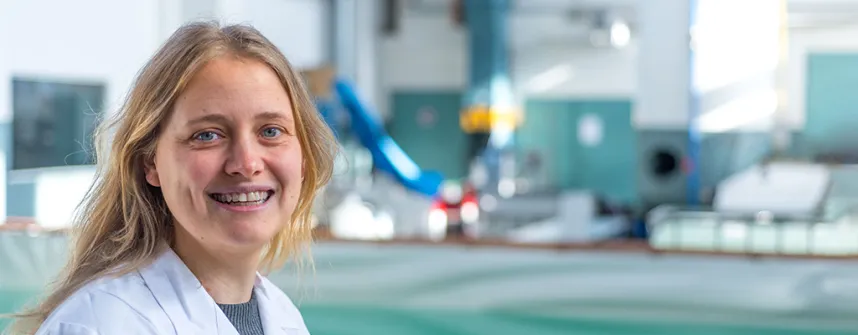Annika Moje: It’s never boring as a chemical laboratory assistant
February 20, 2020
Reliability is essential – as well as responsibility. After all, hazardous substances have to be handled. But above all, Annika Moje thinks, applicants should bring one thing in particular with them: an interest in chemistry. This year, for the first time Jacobs University Bremen will be training two chemical laboratory assistants. The future trainees will be working with Annika Moje. The 36-year-old is in charge of the training program together with a colleague. "It will never be boring," she promises.
Be it chemistry, microbiology or physics – the trainees pass through various research areas. They work closely with students from different cultures and they support the scientists in their research projects. "There are always new tasks", says Annika Moje.
If it were otherwise, she would not have been around for 15 years. After graduating from high school and completing her own training as a chemical laboratory assistant, the native of North Germany joined Jacobs University in 2005. She was attracted to a position in marine research. Water is her element. She enjoys sailing and swimming, and her job has taken her to distant waters on several occasions – most recently on a research trip to the Pacific Ocean for several weeks on board the research vessel "Sonne". "It took five days alone before we reached the region where we collected our samples. You get to meet scientists from all kinds of disciplines, which is great. Such a trip is always an adventure."
Annika Moje is a member of the Geochemistry group of Professor Andrea Koschinsky and Professor Michael Bau. As technical assistant she is responsible for ensuring that the laboratory is running as smoothly as possible. She takes care of the maintenance of the equipment, the ordering of materials and work safety. Above all, however, she has a lot to do with people: with students who are learning to work in the laboratory and who want to develop their first scientific spurs in their final theses. With doctoral students who spend several years researching their topic. And with the scientists' projects and the question of how they can be implemented. "Together we develop methods of processing samples to benefit the research project."
Measuring, that is the analysis of samples, is one of her core tasks. "When I examine a series of samples under certain parameters and these parameters reveal a picture, tell a story – that is what I really enjoy", describes the technical assistant enthusiastically. A stone is then no longer just a stone, a water sample not just a vessel with water, but part of complex natural systems. "With our measuring methods, we suddenly understand which processes take place inside them." For her, this is as exciting to experience as accompanying a doctoral student over several years. "When they get their title, that's a very nice moment, too."
Parallel to her job, Annika Moje has completed a correspondence course over a period of six years. "Of course, I sometimes thought, oh God, what am I doing?" she says, "But it was mainly fun. I just like learning." In 2018 she passed her Bachelor in "Natural Sciences" with a focus on chemistry.
Recently, she went back to school to study again: she completed her training as an instructor, obtained her training certificate and is now allowed to instruct chemical laboratory assistants. She considers it very important that Jacobs University offers traineeships. Not only because the university educates its junior staff, but also out of social responsibility, in order to open up career prospects for young people apart from university studies. "We will provide intensive support for the trainees," she promises, "and make sure they finish their traineeship properly."
This text is part of the series "Faces of Jacobs", in which Jacobs University introduces students, alumni, professors, and staff. Further episodes can be found at www.jacobs-university.de/faces
